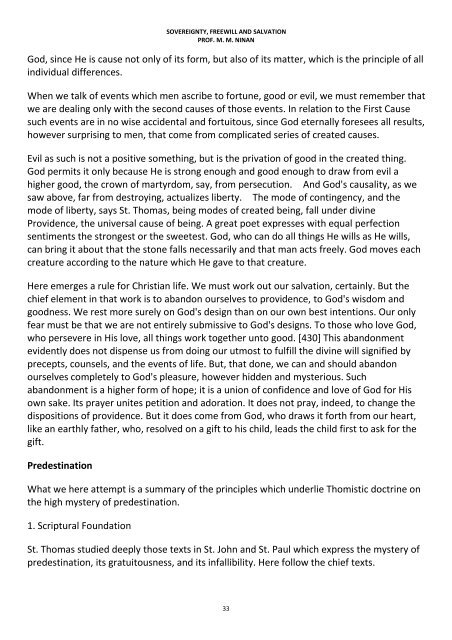Calvinism and Arminianism
You also want an ePaper? Increase the reach of your titles
YUMPU automatically turns print PDFs into web optimized ePapers that Google loves.
SOVEREIGNTY, FREEWILL AND SALVATION<br />
PROF. M. M. NINAN<br />
God, since He is cause not only of its form, but also of its matter, which is the principle of all<br />
individual differences.<br />
When we talk of events which men ascribe to fortune, good or evil, we must remember that<br />
we are dealing only with the second causes of those events. In relation to the First Cause<br />
such events are in no wise accidental <strong>and</strong> fortuitous, since God eternally foresees all results,<br />
however surprising to men, that come from complicated series of created causes.<br />
Evil as such is not a positive something, but is the privation of good in the created thing.<br />
God permits it only because He is strong enough <strong>and</strong> good enough to draw from evil a<br />
higher good, the crown of martyrdom, say, from persecution. And God's causality, as we<br />
saw above, far from destroying, actualizes liberty. The mode of contingency, <strong>and</strong> the<br />
mode of liberty, says St. Thomas, being modes of created being, fall under divine<br />
Providence, the universal cause of being. A great poet expresses with equal perfection<br />
sentiments the strongest or the sweetest. God, who can do all things He wills as He wills,<br />
can bring it about that the stone falls necessarily <strong>and</strong> that man acts freely. God moves each<br />
creature according to the nature which He gave to that creature.<br />
Here emerges a rule for Christian life. We must work out our salvation, certainly. But the<br />
chief element in that work is to ab<strong>and</strong>on ourselves to providence, to God's wisdom <strong>and</strong><br />
goodness. We rest more surely on God's design than on our own best intentions. Our only<br />
fear must be that we are not entirely submissive to God's designs. To those who love God,<br />
who persevere in His love, all things work together unto good. [430] This ab<strong>and</strong>onment<br />
evidently does not dispense us from doing our utmost to fulfill the divine will signified by<br />
precepts, counsels, <strong>and</strong> the events of life. But, that done, we can <strong>and</strong> should ab<strong>and</strong>on<br />
ourselves completely to God's pleasure, however hidden <strong>and</strong> mysterious. Such<br />
ab<strong>and</strong>onment is a higher form of hope; it is a union of confidence <strong>and</strong> love of God for His<br />
own sake. Its prayer unites petition <strong>and</strong> adoration. It does not pray, indeed, to change the<br />
dispositions of providence. But it does come from God, who draws it forth from our heart,<br />
like an earthly father, who, resolved on a gift to his child, leads the child first to ask for the<br />
gift.<br />
Predestination<br />
What we here attempt is a summary of the principles which underlie Thomistic doctrine on<br />
the high mystery of predestination.<br />
1. Scriptural Foundation<br />
St. Thomas studied deeply those texts in St. John <strong>and</strong> St. Paul which express the mystery of<br />
predestination, its gratuitousness, <strong>and</strong> its infallibility. Here follow the chief texts.<br />
33

















